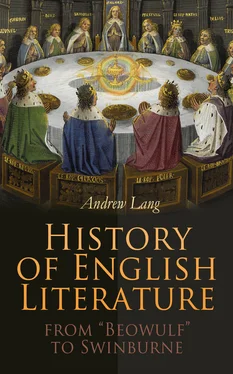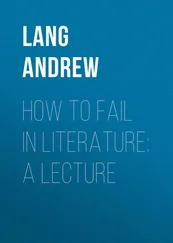All these brave and earnest men, the Wyclifite pamphleteers and "poor priests," and Piers Plowman, with their socialism and their doubts, their "New Theology," were rehearsing in mediaeval costume the drama of to-day; while Chaucer was arraying the heroes of the Fleece of Gold, of Troy, and of the Achæans, in the armour of the men who fought at Crécy and Poitiers. What remains as a gain to literature is the art of Chaucer.
Sweet reasonableness and urbane irony are not to be expected from men full of righteous indignation, and in great danger of being burned alive; for by this penalty did the Church and State suppress the preachers of doctrines which were apt to cause dangerous popular tumults. The Wyclifite Biblical translations look like a canvas later embroidered on by the authors of King James's authorized version, that immortal monument of English prose.
It was not in the nature of these Reformers to follow the counsel of Chaucer's good Parson in the "Parson's Tale" (the spelling may here be modernized, as an example of the poet's prose).
"Certainly chiding may not come but out of a villain's heart, for after the abundance of the heart speaketh the mouth full often. And ye should understand that I Look ever when any man shall chastise another, that he beware of chiding and reproving, for truly, unless he be wary, he may full lightly kindle the fire of anger and of wrath which he should quench, and peradventure slayeth him whom he might chastise with benignity.... Lo, what saith saint Augustine, 'there is nothing so like the Devil's child as he that often chideth'. Now cometh the sin of them that sow and make discord among folk; which is a sin that Christ hateth utterly, and no wonder it is; for he died to make concord. And more sin do they to Christ, than did they that him crucified; for God loveth better that friendship be among folk than he did his own body, which he gave for unity."
Chaucer's country-priest, not the chiding Wyclifite Sons of Thunder, is the true Christian. There is more of the spirit of the Master in the caressing words of Chaucer's address to "little Louis my son... pray God save the king that is Lord of this lande, and all that him faith beareth and obeyeth, each in his degree, the more, and the less," than in torrents of bitter chiding, and a hail of unpublishable vituperation.
The English of Chaucer's treatise of "The Astrolabe," despite its difficult astronomical matter, is pellucid, and there is a charm of rhythm in his prose translations of the verses in Boëthius.
The English prose of John Trevisa, a Cornish priest, educated at Oxford, and a traveller on the continent (died 1412), was entirely given to translation from the Latin. He is said, by Caxton, to have translated the Bible: he certainly made an English version of the "Polychronicon" of Ranulf Higden, the monk of Chester, which begins with the Creation, and is rich in geographical and social information.
Trevisa occasionally inserts notes of his own. His versions of Higden, and of the mythical popular science and prodigious fables contained in the "De Proprietatibus Rerum" ("Concerning the Properties of Things") of Bartholomæus the Englishman, were very popular, as their amusing nature deserved, and the "Polychronicon" was printed by Caxton. Trevisa himself tells us that in his day English boys in grammar schools were ceasing to learn French, and there was a public for English books supposed to be educational.
The most famous and by far the most interesting of these adapters of foreign books is the so-called Sir John Mandeville, with his "Voiage and Travaile". The author of this book was not an Englishman, at least he did not write in English, and did write in French, at Liège, about the end of the fourteenth century. It is impossible and unnecessary to discuss here the fables about Mandeville. The author of the book declares that he himself is "Sir John to all Europe," is an Englishman born at St. Albans, that he passed the sea in 1322, that he travelled in Tartary, Persia, Armenia, Lybia, Chaldæa, the land of the Amazons, India, and so forth. In fact he resembles Widsith in the ancient Anglo-Saxon poem—he has been almost everywhere and knows almost everything. He especially writes for pilgrims to Jerusalem; he first wrote his book in Latin, then translated it into French, and finally into English. There are countries that he has not seen; and he says that he could not play a part in the deeds of arms which he beheld. Now he suffers from arthritis, "gowtes artetykes," and he amuses himself by writing his adventures in 1357.
Another version of Sir John's career is given by Jean d'Outremeuse, a writer of histories, who had the felicity of hearing from an old man with a beard in 1472, that he was the genuine Mandeville: but that the author was really Jean d'Outremeuse is not so certain. The author, whoever he was, stole from a manuscript of the time of the First Crusade, and from the book of Odoric, a Franciscan missionary, and the Itinerary of William of Boldensele, (1332-1336) from a History of the Mongols, from a forged letter of Prester John—from every source whence he could pick amusing stories. He fabled with a direct and honourable simplicity which is comparable to that of Defoe, and to the straightforward and moderate statements of Swift's Captain Lemuel Gulliver. With the spelling modernized it is thus that the good knight tells the story of the Pygmies who were known to Homer for their battles with the cranes.
"The folk be of little stature, but three span long, and they be right fair and gentle, after their quantity, both the men and the women. And they marry them when they be half a year of age, and get children. And they live not but six or seven years at the most. And he that liveth eight years, men hold him there right passing old.... And they have often war with the birds of the country that they take and eat. These little folks labour neither in lands nor in vineyards. But they have great men among them of our stature that till the land and labour amongst the vines for them. And of the men of our stature have they a great scorn and wonder as we would have among us of Giants if they were amongst us."
Mandeville speaks as calmly about the ants, known to Herodotus, which guard the hills of gold, and are as large as hounds; and of the devil's head in the valley perilous, through which the knight and his company travelled in great fear, "and therefore were we the more devout a great deal". Thence he reached an isle where men are from twenty-eight to thirty feet in stature, "and they eat more gladly men's flesh than any other flesh," being indeed the Læstrygonians who devoured the men of Odysseus, or the Mermedonians of the Anglo-Saxon poem of "St. Andreas," who meant to devour St. Matthew. Mandeville enjoyed and deserved great popularity, being a follower of Lucian's "True History," and a predecessor of Gulliver.
A writer of English prose even more interesting, though much less popular and amusing than Mandeville, is Reginald Pecock (1395-1460), the deposed Bishop of Chichester, author of "The Repressor of overmuch blaming of the Clergy". The clergy blamed Pecock, and repressed him. This remarkable man, born shortly before the date of Chaucer's death, in North Wales, was a Fellow of Oriel College, Oxford (1417), was patronized by Humphrey, Duke of Gloucester, obtaining the Mastership of Lord Mayor Whittington's school in London (1431), became Bishop of St. Asaph (1444), and passed his life in attempts to convert the Lollards by persuasion, not by the stake. "The clergy shall be condemned at the last day," he writes, "if by clear wit they draw not men into consent of true faith otherwise than by fire, sword and hangment; although I will not deny these second means to be lawful, provided the former be first used." In the opinion of the Lollards, nothing in ecclesiastical matters was defensible that was not positively inculcated in the Bible as interpreted by the average Christian man, however unlettered. Pecock defended Episcopacy, and even defended non-preaching Bishops, on the score that they had to discharge more important duties. Even the much abused friars he stood up for, arguing that, whatever their offences, they and the world would be worse rather than better if there were no religious orders. His arguments in support of the begging Franciscans who, in counting up money, touched it with a stick, not with the hand, are certainly even more sophistical than ingenious.
Читать дальше












